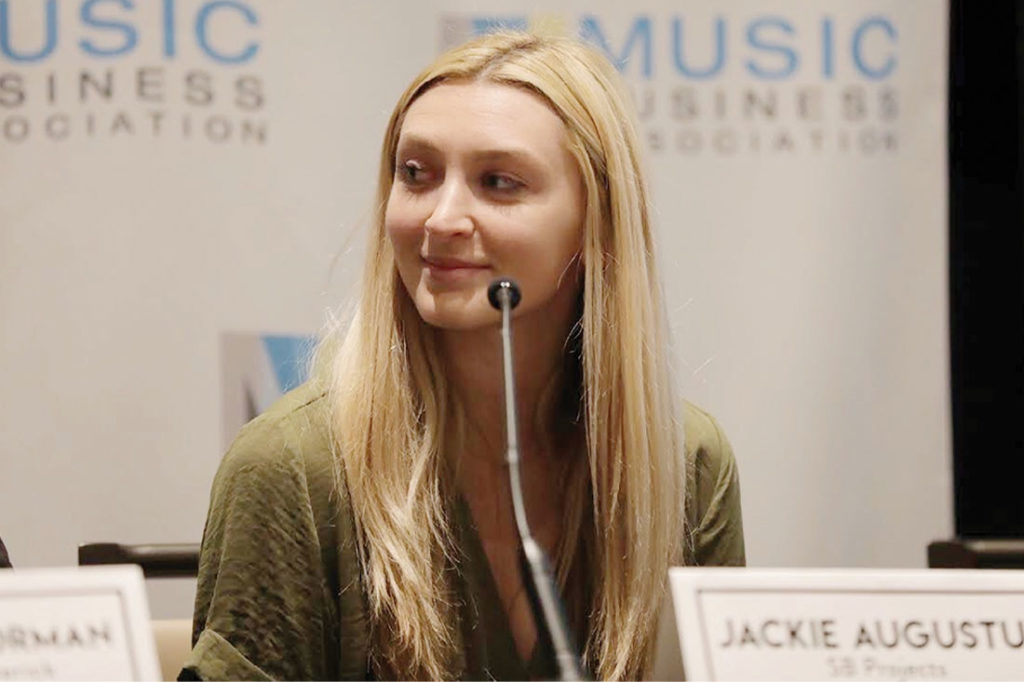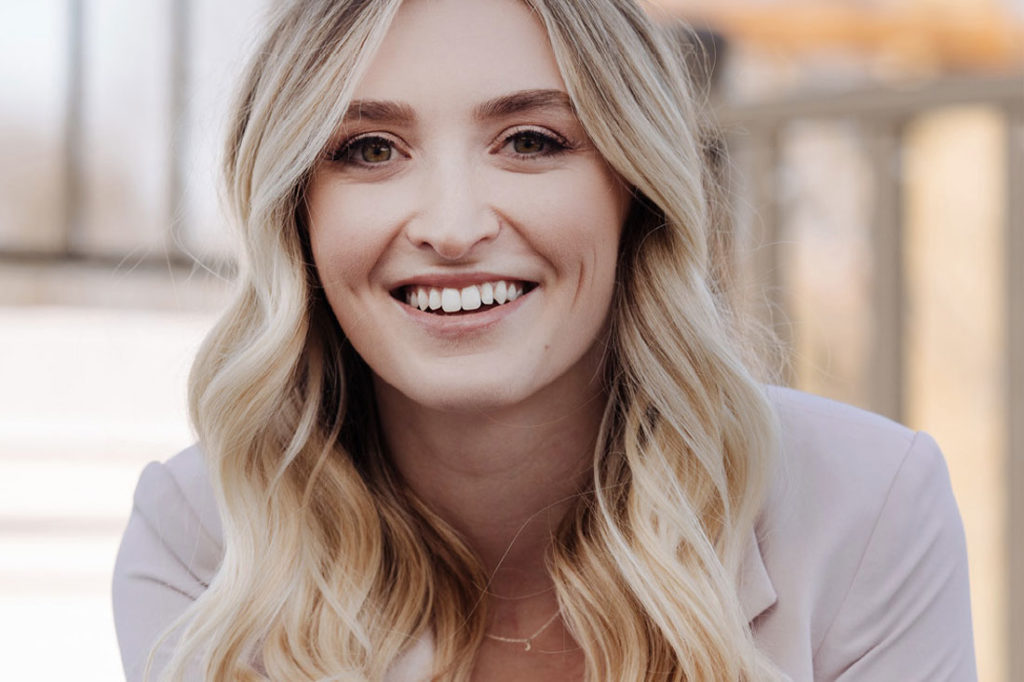Opening night. A restless crowd hums with anticipation, waiting for the artist to take the stage. Jackie Augustus watches from the side of the stage, feeling as much a part of the audience as she does a member the artist’s team.
The artist might change—Augustus has worked with Justin Bieber, Ariana Grande, Demi Lovato and more—but her reaction to watching from the wings as the lights go out stays the same.
Her nerves jangle as she watches fans holding up their phones. She straddles the two worlds, feeling a deep connection both to the fans in the stands and the artists who thrill them. She remembers when she was one of the screaming masses in the audience. She still is, really, except she has managed to turn that passion into a career. And while she didn’t write the melodies, pen the lyrics or choreograph the dance moves, she worked behind the scenes. Her job is to craft the star’s digital and marketing strategy, helping to cultivate the rabid fanbase seen out in the audience. She feels, even in an admittedly small way, part of the team.
The show begins. The crowd goes wild. Augustus reminds herself that though her career has taken her places like this often enough for it to seem normal, it most certainly is not. “Wow,” she tells herself. “Pinch me. This is my life.”
Her rise in the digital marketing space has very much been the fulfillment of a dream. At 14, she started MySpace fan accounts for the Jonas Brothers and Demi Lovato. Her passion for the then relatively unknown Justin Bieber ran particularly deep. In 2009 she launched a Bieber fan account on Twitter (@bieberarmy). That grew and morphed as is possible only in the digital age. It caught Bieber’s attention and then that of Scooter Braun, the entrepreneur whose SB Projects manages some of the biggest artists in the world. Braun hired her when she was still a teenager. She packed her belongings into her car and drove from her parents’ home in Allentown, Pennsylvania, to Los Angeles.
She showed up for her first day dressed like a professional to an office full of people in T-shirts and baseball hats. She didn’t know important details, such as what her job was. Nobody else seemed to know, either.
She met with an executive who asked her what job she wanted. She said she liked to tweet, so he named her the social media coordinator. She worked her way up from there. Now 26 and head of digital marketing for SB Projects, Augustus’s work has reached more than 1 billion people.
While the entertainment world she inhabits is unique, what she has learned about social media, digital marketing and the ever-changing landscape of an increasingly online world applies across a broad spectrum of businesses. Best practices are best practices, quality is quality, and authenticity is authenticity, no matter if the subject is pop music or pop-up stores, solo albums or solopreneurs.
Augustus is every bit the rockstar in her line of work as the musicians who she works with are in their own respective genres. These are her lessons.
Push the envelope, but don’t be reckless.
“I love being a guinea pig when it comes to the intersection of tech and music,” Augustus says.
Early in her career at SB Projects, partly just to keep busy when there wasn’t much for her to do, Augustus wrote a weekly email she called Tech Tuesday. In it, she would describe the hot new apps and features in the social media world. Even now that she has plenty to do, she stays informed as if she’s still writing Tech Tuesday. She also closely watches social media and marketing trends in other fields and cherry-picks what works.
She’s more likely to take risks when the stakes are lower. She’ll experiment first, either running tests by herself or with a lower-tier artist. That way she can analyze how it works—are the push notifications on? Do the comments scroll too quickly? Does it require a level of tech savvy a musician might lack?
She follows a more conservative approach in terms of content. When she starts with new clients, she scours their feeds to clean out potential problems. If there’s any uneasiness about new content, she runs it by trusted advisors.
Before she will align with an influencer, she makes sure that person hasn’t done or said anything that will reflect poorly on the client. “Cancel culture is real, and you’ve got to stay very alert,” she says.
Authenticity is crucial.
Fans sniff out poseurs instantly and recognize depth of passion and knowledge just as quickly. Augustus loves nostalgic nods—posting old videos or references to past highlights. Those help indoctrinate new fans and serve as knowing winks to longtime fans as a way of thanking them for being there.
She studies her clients’ word choice and style to create a full picture of their voices. Sometimes that means asking them strange-sounding questions like, “Do you always write in lowercase?” or “What’s your favorite emoji?” With that knowledge, she can advise on strategies for authentic connection.
Study the audience.
Analytics are important, but this goes deeper than that. “I always try to keep the fan inside me alive,” she says. Sometimes she imagines the 15-year-old version of herself—what would she want to know? How would she want to receive the information?
She also uses her younger siblings as sources of what the younger generation is talking about.
Every platform is different.
“It’s not necessarily about, OK, I need to try to grow my following across all platforms at one time,” she says. “That’s amazing if you can figure that out. But it’s overwhelming. There are just so many.”
If a social media expert doesn’t advocate hitting every platform, a solopreneur who is pressed for time shouldn’t either. A better approach is to find out where your customers are and focus on that app. The differences are subtle but important.
Augustus thinks of Instagram like a résumé, a place where you want to be “clean and shiny and super pretty.” Once you are verified, she suggests commenting on the pages of peers. The key is to be authentic and not come off as trying too hard.
She calls Twitter the “personality version of you.” It’s less polished, more “on the fly” than Instagram.
And because the platform changes constantly, Augustus says Facebook isn’t as easy to define as the other two. It can be good for news (and discussions thereof), merchandise sales, and international markets. Users skew older.

Set boundaries early.
Augustus started college at 16, is an overachiever of the highest order and works in an industry with unconventional hours. Throw in the fact that the social media world runs 24/7/365. At a certain point, she had to learn to shut off.
For too long, Augustus says, she wouldn’t put her phone on Do Not Disturb. When she got an email in the middle of the night, she answered it, no matter how irrelevant it was.
The internet never sleeps, and neither did she. She inched dangerously close to burning out.
Now she has learned to unplug, and when she talks to college students or other young people, she encourages them to do the same now rather than later. Work hard, not long, she tells them.
“It’s hard to untangle that later without people thinking, Oh well she’s maybe not as interested, or maybe she’s slacking off,” she says. “We’ve got to really set boundaries. Even if it’s just turning my camera off for a meeting [because] I’m in sweats. I’m getting my work done, but you don’t need to see me. That’s what my mental health needs.”
There’s a lesson we can all heart.
This article originally appeared in the July/August 2021 issue of SUCCESS magazine.
Feature image © Catherine Powell
Photo by © Music Business Association



